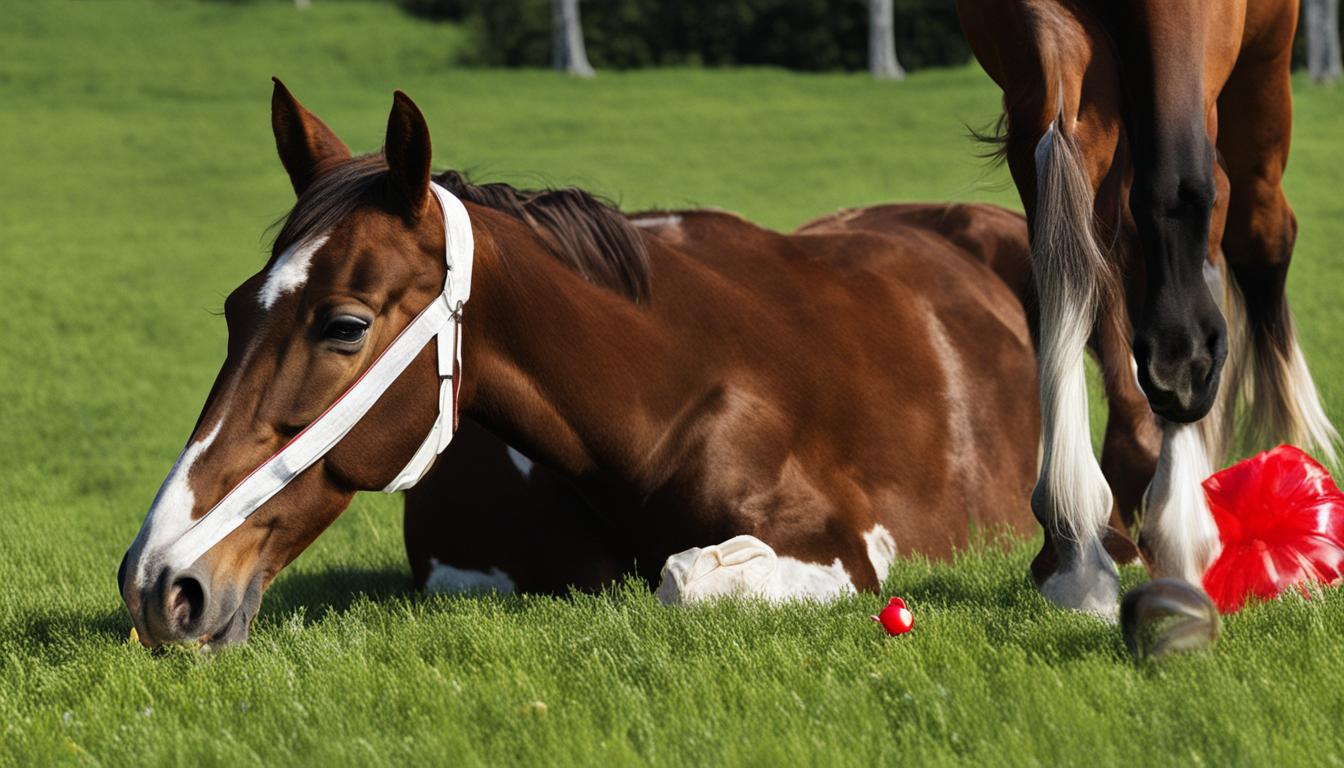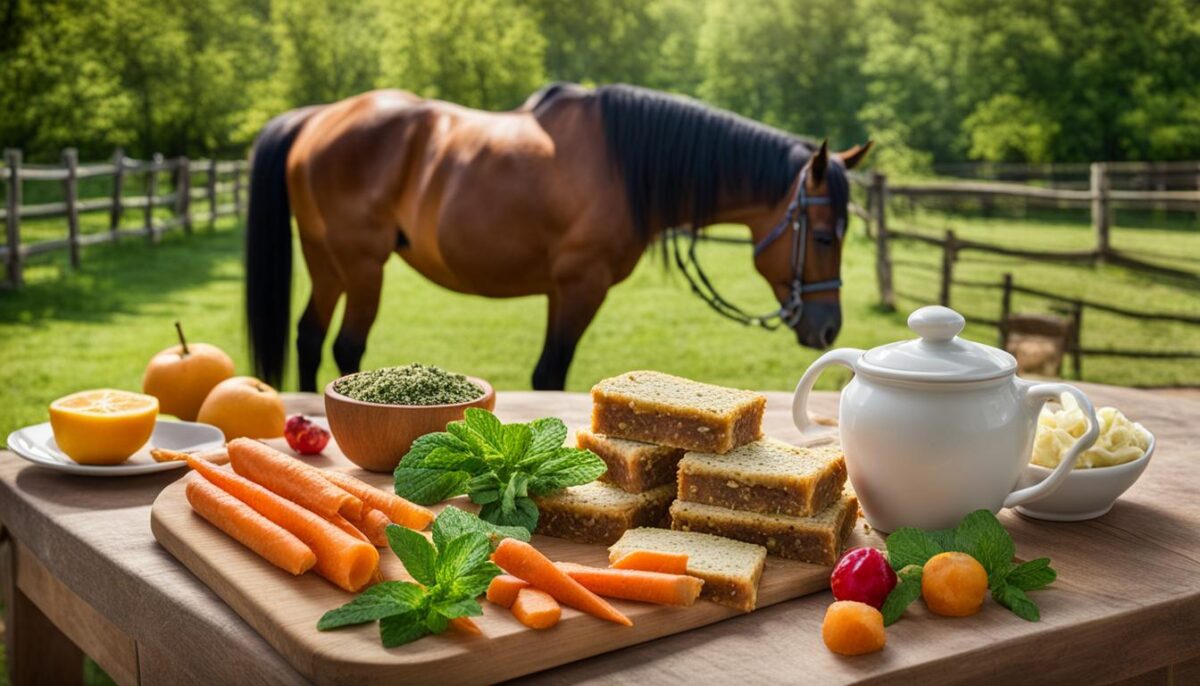Peppermints are a popular choice when it comes to horse treats, and most horses absolutely adore them. While they can be a tasty and enjoyable snack, it is essential to understand the impact of these sugary horse treats on your beloved equine friend’s health.
Every horse owner should make a point to learn about horse care and be aware of any potential concerns that could arise from indulging their horses with equine snacks like peppermint candies. Factors such as sugar content, equine health, and the specific needs of each horse play a significant role in peppermint safety and, ultimately, the well-being of your horse.
Key Takeaways
- Peppermints can be enjoyed by horses, but their sugar content may pose health concerns.
- Excessive sugar intake can lead to insulin resistance, laminitis, and other health issues in horses.
- It’s essential to consider a horse’s daily dietary needs when offering sugary treats like peppermints.
- Know your horse’s specific health conditions and consider sugar-free alternatives if needed.
- Responsible horse care includes offering treats in moderation to ensure a balanced diet and overall equine health.
Understanding Your Horse’s Sugar Intake
Knowing how much sugar is present in your horse’s diet and how it impacts their health is essential for responsible care. In this section, we will discuss how sugar affects horses, the comparison of treat sugars to their daily dietary requirements, and the digestive differences between various sugar sources.
How Sugar Affects Horses
Glucose from sugar intake stimulates the release of insulin, which helps glucose enter a horse’s cells. Consuming large amounts of sugar can lead to insulin resistance and an increased risk of laminitis, among other issues. Understanding the role that sugar plays in your equine’s overall health is vital in mitigating potential problems.
Comparing Treat Sugars to Daily Dietary Needs
A horse’s daily diet typically contains nonstructural carbohydrates (NSC), which include sugars and starch. To gauge the impact of occasional treats, it’s essential to have context for additional sugar from treats within your horse’s diet:
| Treat | Sugar Content (grams) |
|---|---|
| Peppermint | 15 |
| Sugar Cube | 3 |
| Carrot | 6 |
| Apple | 19 |
Keeping track of treat sugar content can help maintain a healthy equine sugar intake and avoid potential health problems.
Digestion Differences: Sugar Cubes vs. Hay
The form in which sugar is consumed, such as through sugar cubes or hay, affects the rate at which it is absorbed and the resulting glucose spike in blood. For example, sugar in hay is absorbed at a slower rate, preventing rapid glucose fluctuations. Treats like sugar cubes or peppermints, on the other hand, can cause a more sudden increase in blood glucose levels.
By understanding how different sources of sugar impact your horse’s digestion, you can make informed decisions about appropriate treat choices and maintain a balanced diet for your equine friend.
The Impact of Sugary Treats on Horse Health
Insulin resistance (IR) is a significant horse health risk that may lead to excessive insulin circulation, increasing the likelihood of developing laminitis. Horses with Polysaccharide Storage Myopathy (PSSM) have abnormal glycogen storage in muscle tissue, and a high-sugar diet can exacerbate this condition.
Consuming excessive amounts of sugar can lead to the production of volatile fatty acids, which can make the stomach more acidic. This may result in Equine Gastric Ulcer Syndrome (EGUS). Overweight horses or those with a history of laminitis should avoid sugary treats to manage their condition effectively and maintain overall health.
To ensure you are treating horses safely, it is essential to consider their individual health needs and any existing medical conditions. When feeding treats to horses, moderation is crucial to prevent adverse health effects. Be sure to monitor your horse for any signs of discomfort or changes in behavior after giving them sugary treats, as this could indicate an underlying health issue that needs attention.
Can Horses Eat Peppermints: Weighing the Risks
Before giving your horse peppermint treats, it’s essential to consider their overall health and sugar tolerance. Some horses may not handle sugar well due to insulin resistance, laminitis history, or other metabolic disorders. Understanding your horse’s health conditions and how they react to sugary treats is crucial when assessing the suitability of peppermints for them.
Health Conditions Impacted by Sugar
Equine metabolic syndrome and Cushing’s in horses are among the health conditions that could negatively affect a horse’s sugar tolerance. Horses suffering from these disorders may require sugar-free or low-sugar diets to manage their health. With this in mind, it’s crucial to weigh the risks before offering sugary peppermint treats for horses with such conditions.
Identifying Horses Suited for Sugary Treats
Healthy horses without any pre-existing metabolic disorders may enjoy occasional sugary treats without significant issues. However, it’s essential always to monitor your horse’s reaction to new treats, especially those containing sugar. If you notice weight gain or any discomfort after giving them peppermints, it might be best to opt for alternative, sugar-free options.
Treating with Care: Signs to Watch Out For
Monitor your horse for any signs indicating a reduced sugar tolerance, like obesity, increased thirst, or excessive urination. If you observe such warning signs, it’s best to avoid giving them sugary peppermint treats and consult your veterinarian for advice on an appropriate diet.
In conclusion, while peppermint treats can be a delightful snack for horses, they should be given with care, considering the horse’s sugar tolerance and overall health. It’s crucial to understand and monitor your horse’s health conditions and reaction to sugar to ensure their wellbeing and happiness.
Alternatives to Sugary Peppermints
Since peppermints can be high in sugar and potentially harmful for some horses, it’s essential to consider healthier alternatives. There are several sugar-free horse treats and natural equine snacks that provide the benefits of peppermint without the risks.
One option for a healthier horse treat is mint candy sweetened with sorbitol, which replaces sugar while maintaining the enjoyable minty flavor. In addition to that, there are mint-flavored equine treats specifically designed for horses, providing a safer choice for their dietary needs.
For the most natural option, turn to pure peppermint powder or fresh mint leaves as preferred sugar-free alternatives. These can offer the same soothing and refreshing effects without adding excess sugar to your horse’s diet. The table below illustrates some popular peppermint options that take into account the horse’s sugar allowance.
| Healthy Horse Treats | Benefits | Suitable for |
|---|---|---|
| Mint candy with sorbitol | Sweet, minty taste without added sugar | All horses, including those with sugar restrictions |
| Mint-flavored equine treats | Offers the taste and health benefits of mint without sugar | All horses, especially those prone to insulin resistance or laminitis |
| Pure peppermint powder or fresh mint leaves | Natural, sugar-free option with the benefits of peppermint | Horses with sugar restrictions or those seeking a more natural treat option |
It’s important to always practice moderation when offering your horse treats, even healthy ones. This ensures that the treats won’t lead to any habit formation or imbalance in their diet. Remember that responsible equine care involves striking a balance between providing enjoyable treats and maintaining your horse’s overall health and well-being.
Conclusion
In conclusion, peppermint treats can be a delightful snack for horses when given responsibly. It is essential to keep in mind the sugar content of these treats and the horse’s overall health when offering them as a special reward. Ensuring horse treat safety and practicing peppermint moderation is vital to maintain a balanced diet for your equine friend.
Being aware of any health concerns that may affect your horse’s sugar tolerance is also crucial in responsible equine care. By offering peppermints sparingly, along with sugar-free versions or other healthy horse snacks, you can contribute to a well-rounded equine management routine.
Always prioritize your horse’s health and dietary needs when choosing treats and remember to offer them in moderation. This way, you can ensure their well-being and strengthen the bond between you and your majestic companion.
FAQ
Are peppermints safe for horses to eat?
Yes, peppermints are generally safe for horses to eat in moderation. However, it’s essential to take into consideration any health conditions or dietary restrictions that might affect the horse’s sugar tolerance, such as insulin resistance, laminitis, or equine metabolic syndrome.
How does sugar affect a horse’s health?
Sugar consumption can lead to health issues such as insulin resistance, laminitis, polysaccharide storage myopathies (PSSM), and equine gastric ulcer syndrome (EGUS). Excess sugar intake can also cause weight gain and contribute to obesity in horses.
What are some alternatives to sugary peppermints for horses?
Alternatives to sugary peppermints include treats with no added sugar or sweetened with sorbitol, mint-flavored equine treats, fresh mint leaves, and pure peppermint powder. These are safer options for horses that are sensitive to sugar intake or have specific health conditions.
How can I ensure I’m giving my horse treats responsibly?
To give your horse treats responsibly, always prioritize their health and dietary needs. Offer treats sparingly and in small quantities, and balance treats with their regular diet. Be aware of any health concerns that might affect their sugar tolerance, and consider using sugar-free or low-sugar alternatives when necessary.
What health conditions in horses are impacted by sugar intake?
Health conditions in horses that can be impacted by sugar intake include insulin resistance, laminitis, polysaccharide storage myopathies (PSSM), equine gastric ulcer syndrome (EGUS), and obesity. Horses with these conditions should be given sugar-free or low-sugar treats to manage their health effectively.


